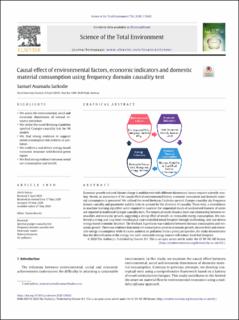Causal effect of environmental factors, economic indicators and domestic material consumption using frequency domain causality test
Peer reviewed, Journal article
Published version
Permanent lenke
https://hdl.handle.net/11250/2661460Utgivelsesdato
2020Metadata
Vis full innførselSamlinger
Originalversjon
Sarkodie, S. A. (2020). Causal effect of environmental factors, economic indicators and domestic material consumption using frequency domain causality test. Science of the Total Environment, 739: 139602. doi: 10.1016/j.scitotenv.2020.139602Sammendrag
Economic growth-induced climate change is multifaceted with different dimensions, hence, requires scientific scrutiny. Herein, an assessment of the causal effect of environmental factors, economic assessment and domestic material consumption is presented. We utilized the novel Breitung-Candelon spectral Granger-causality aka frequency domain causality and parameter stability tests to account for the direction of causality. These tests, a resemblance to machine learning algorithm were required to examine the sequential shock of unobserved features of series not reported in traditional Granger-causality tests. The empirical results found a short-run relationship between renewables and economic growth, suggesting a strong effect of wealth on renewable energy consumption. We confirmed a strong and long-term metallurgical coal-controlled metal footprint through steelmaking, and coal-driven energy-based economic structure. The feedback hypothesis was validated between biomass consumption and economic growth. There was evidence that metal ore consumption predicts economic growth, income level and renewable energy consumption while it causes ambient air pollution. From a policy perspective, the study demonstrates that the diversification of the energy mix with renewable energy sources will reduce fossil fuel footprint.

